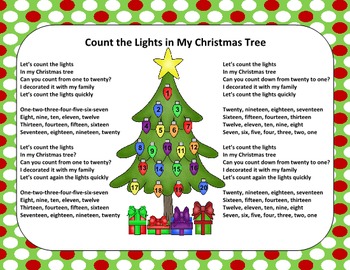

According to some accounts, General Robert E. By 1864, the Southern Punch noted that the song was "decidedly most popular" among the "claimants of a national song" for the Confederacy. Confederate States Army bands played the song after they crossed into Maryland territory during the Maryland Campaign in 1862. It was sometimes called "the Marseillaise of the South".
My christmas tree lyrics series#
It became instantly popular in Maryland, aided by a series of unpopular federal actions there and throughout the South. The poem was quickly turned into a song-put to the tune of "Lauriger Horatius"-by Baltimore resident Jennie Cary, sister of Hetty Cary. It was first published in the New Orleans Sunday Delta. The poem contains many references to the Revolutionary War as well as to the Mexican–American War and Maryland figures in that war (many of whom have fallen into obscurity). what may be called a conflagration of the senses, if not an inspiration of the intellect". Being unable to sleep after hearing the news, he claimed that "some powerful spirit appeared to possess me.

Randall later claimed the poem was written "almost involuntarily" in the middle of the night on April 26, 1861. The poem was a plea to his home state of Maryland to secede from the Union and join the Confederacy. Randall, a native Marylander, was teaching at Poydras College in Pointe Coupee Parish, Louisiana, at the time and, moved by the news of his friend's death, wrote the nine-stanza poem "Maryland, My Maryland". One of the reported victims of these troop transport riots was Francis X. The contentious issue of troop transport through Maryland would lead one month later to the Chief Justice of the Supreme Court, also a Marylander, penning one of the United States' most controversial wartime rulings, Ex parte Merryman. At this time the legislature seems to have wanted to avoid involvement in a war against its seceding neighbors. The Maryland legislature summarized the state's ambivalent feelings when it met soon after, on April 29, voting 53–13 against secession, but also voting not to reopen rail links with the North, and requesting that Lincoln remove the growing numbers of federal troops in Maryland. A number of Union troops and Baltimore residents were killed in the Baltimore riots. Riots ensued as Union troops came through Baltimore on their way south in April 1861 and were attacked by mobs. There was considerable Confederate sympathy in Maryland at the time, as well as a large number of residents who objected to waging a war against their southern neighbors. Many of these troops were brought through Baltimore City, a major transportation hub. troops to be brought to Washington, D.C., to protect the capital and to prepare for war with the seceding southern states. President Abraham Lincoln (referred to in the poem as "the despot" and "the tyrant") ordered U.S. The poem was a result of events at the beginning of the Civil War.


 0 kommentar(er)
0 kommentar(er)
